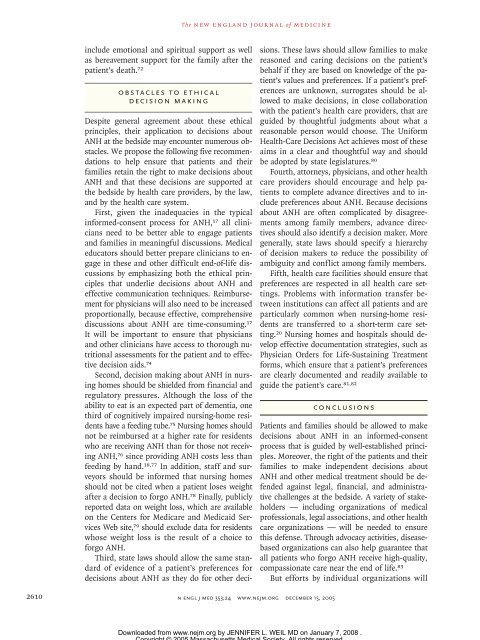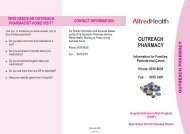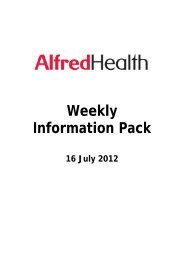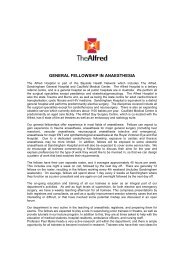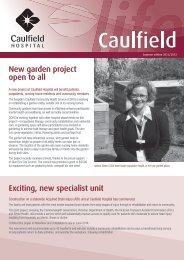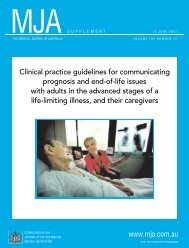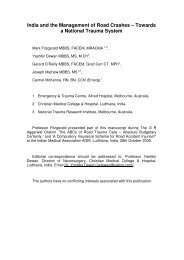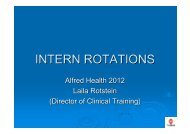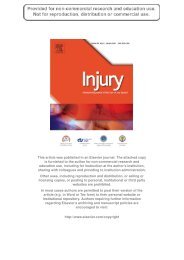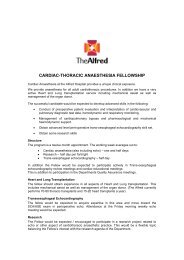Appropriate Use of Artificial Nutrition and Hydration — Fundamental ...
Appropriate Use of Artificial Nutrition and Hydration — Fundamental ...
Appropriate Use of Artificial Nutrition and Hydration — Fundamental ...
Create successful ePaper yourself
Turn your PDF publications into a flip-book with our unique Google optimized e-Paper software.
The new engl<strong>and</strong> journal <strong>of</strong> medicine<br />
include emotional <strong>and</strong> spiritual support as well<br />
as bereavement support for the family after the<br />
patient’s death. 72<br />
obstacles to ethical<br />
decision making<br />
Despite general agreement about these ethical<br />
principles, their application to decisions about<br />
ANH at the bedside may encounter numerous obstacles.<br />
We propose the following five recommendations<br />
to help ensure that patients <strong>and</strong> their<br />
families retain the right to make decisions about<br />
ANH <strong>and</strong> that these decisions are supported at<br />
the bedside by health care providers, by the law,<br />
<strong>and</strong> by the health care system.<br />
First, given the inadequacies in the typical<br />
informed-consent process for ANH, 17 all clinicians<br />
need to be better able to engage patients<br />
<strong>and</strong> families in meaningful discussions. Medical<br />
educators should better prepare clinicians to engage<br />
in these <strong>and</strong> other difficult end-<strong>of</strong>-life discussions<br />
by emphasizing both the ethical principles<br />
that underlie decisions about ANH <strong>and</strong><br />
effective communication techniques. Reimbursement<br />
for physicians will also need to be increased<br />
proportionally, because effective, comprehensive<br />
discussions about ANH are time-consuming. 17<br />
It will be important to ensure that physicians<br />
<strong>and</strong> other clinicians have access to thorough nutritional<br />
assessments for the patient <strong>and</strong> to effective<br />
decision aids. 74<br />
Second, decision making about ANH in nursing<br />
homes should be shielded from financial <strong>and</strong><br />
regulatory pressures. Although the loss <strong>of</strong> the<br />
ability to eat is an expected part <strong>of</strong> dementia, one<br />
third <strong>of</strong> cognitively impaired nursing-home residents<br />
have a feeding tube. 75 Nursing homes should<br />
not be reimbursed at a higher rate for residents<br />
who are receiving ANH than for those not receiving<br />
ANH, 76 since providing ANH costs less than<br />
feeding by h<strong>and</strong>. 18,77 In addition, staff <strong>and</strong> surveyors<br />
should be informed that nursing homes<br />
should not be cited when a patient loses weight<br />
after a decision to forgo ANH. 78 Finally, publicly<br />
reported data on weight loss, which are available<br />
on the Centers for Medicare <strong>and</strong> Medicaid Services<br />
Web site, 79 should exclude data for residents<br />
whose weight loss is the result <strong>of</strong> a choice to<br />
forgo ANH.<br />
Third, state laws should allow the same st<strong>and</strong>ard<br />
<strong>of</strong> evidence <strong>of</strong> a patient’s preferences for<br />
decisions about ANH as they do for other decisions.<br />
These laws should allow families to make<br />
reasoned <strong>and</strong> caring decisions on the patient’s<br />
behalf if they are based on knowledge <strong>of</strong> the patient’s<br />
values <strong>and</strong> preferences. If a patient’s preferences<br />
are unknown, surrogates should be allowed<br />
to make decisions, in close collaboration<br />
with the patient’s health care providers, that are<br />
guided by thoughtful judgments about what a<br />
reasonable person would choose. The Uniform<br />
Health-Care Decisions Act achieves most <strong>of</strong> these<br />
aims in a clear <strong>and</strong> thoughtful way <strong>and</strong> should<br />
be adopted by state legislatures. 80<br />
Fourth, attorneys, physicians, <strong>and</strong> other health<br />
care providers should encourage <strong>and</strong> help patients<br />
to complete advance directives <strong>and</strong> to include<br />
preferences about ANH. Because decisions<br />
about ANH are <strong>of</strong>ten complicated by disagreements<br />
among family members, advance directives<br />
should also identify a decision maker. More<br />
generally, state laws should specify a hierarchy<br />
<strong>of</strong> decision makers to reduce the possibility <strong>of</strong><br />
ambiguity <strong>and</strong> conflict among family members.<br />
Fifth, health care facilities should ensure that<br />
preferences are respected in all health care settings.<br />
Problems with information transfer between<br />
institutions can affect all patients <strong>and</strong> are<br />
particularly common when nursing-home residents<br />
are transferred to a short-term care setting.<br />
20 Nursing homes <strong>and</strong> hospitals should develop<br />
effective documentation strategies, such as<br />
Physician Orders for Life-Sustaining Treatment<br />
forms, which ensure that a patient’s preferences<br />
are clearly documented <strong>and</strong> readily available to<br />
guide the patient’s care. 81,82<br />
conclusions<br />
Patients <strong>and</strong> families should be allowed to make<br />
decisions about ANH in an informed-consent<br />
process that is guided by well-established principles.<br />
Moreover, the right <strong>of</strong> the patients <strong>and</strong> their<br />
families to make independent decisions about<br />
ANH <strong>and</strong> other medical treatment should be defended<br />
against legal, financial, <strong>and</strong> administrative<br />
challenges at the bedside. A variety <strong>of</strong> stakeholders<br />
<strong>—</strong> including organizations <strong>of</strong> medical<br />
pr<strong>of</strong>essionals, legal associations, <strong>and</strong> other health<br />
care organizations <strong>—</strong> will be needed to ensure<br />
this defense. Through advocacy activities, diseasebased<br />
organizations can also help guarantee that<br />
all patients who forgo ANH receive high-quality,<br />
compassionate care near the end <strong>of</strong> life. 83<br />
But efforts by individual organizations will<br />
2610<br />
n engl j med 353;24 www.nejm.org december 15, 2005<br />
Downloaded from www.nejm.org by JENNIFER L. WEIL MD on January 7, 2008 .<br />
Copyright © 2005 Massachusetts Medical Society. All rights reserved.


